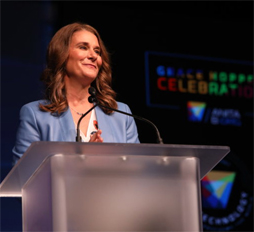37 from Columbia and Barnard attend bigger-than-ever Grace Hopper Celebration

The timing isn’t great—mid-semester with early projects coming due and midterms beginning—but still they come; 37 from Columbia and Barnard traveled to Orlando earlier this month to join 18,000 other women in tech for the Grace Hopper Celebration, an annual gathering co-produced by AnitaB.org (formerly the Anita Borg Institute) and the Association for Computing Machinery.
For three days (Oct 4-6) attendees listened to 16 keynote speakers—among them Melinda Gates, Fei-Fei Li (Professor and Director of Stanford’s AI Lab and Chief Scientist at Google Cloud), and Megan Smith (Former US Chief Technology Officer). They signed up for technical panels on AI, wearable technologies, data science, software engineering, and dozens of other innovative technologies. They networked with their peers and listened to pitches from recruiters who flock to the event.
But for many, the main draw is just being among so many other women who share their interests in computer science and engineering. In fields dominated by men, the Grace Hopper Celebration (GHC) is one of the few tech venues where women run the show. Here they are the speakers, panelists, and attendees, sharing what they love about technology and what they hope to accomplish in their careers or in their research. They share also stories of workplace discrimination, slights, and sometimes blatant sexism as well as tangible recommendations for what works to keep women in technology.

Columbia CS major Tessa Hurr, attending for the fourth time, describes it this way: “GHC is a community of women who are there to support one another and lift one another up and encourage one other to pursue a career in STEM.” A senior about to embark on a career, she especially wanted to hear from women about their work experiences. “Coming from Columbia, where the engineering school and computer science department have done a lot of work to balance the ratio of males to females, you see a lot of other women and you don’t feel alone. But in industry, you see the problem of gender imbalance so glaringly. Being at GHC, I know there are support systems if I need them.”
Women at GHC may be excited about supporting other women in technology, but they’re just as enthusiastic about technology itself and the good it can do in the world. Says Hurr, “Sometimes when you’re learning different concepts in class you don’t necessarily see how they translate over to the real world; GHC tech talks help bridge that gap so you better understand how you can have an impact on the world and work towards social good through tech.”
Myra Deng, a CS student attending for the first time, appreciated the emphasis on new technologies, especially AI. A talk by keynote speaker Fei-Fei Li linking AI and diversity was especially inspiring to Deng, who is on the Intelligent Systems track. “Professor Li talked about how AI is supposed to represent the entire human experience but you can’t really model or build that with just a small section of the human population. Diversity isn’t just being nice in the workplace; it’s essential to getting the technology right.”
This mix of technology and support system is a powerful thing, and GHC has been growing by leaps and bounds. In four years, GHC has grown from 8000 to 18,000 participants.
Many attend by taking advantage of scholarships offered by some of the big tech companies. “If the concern is finances, there are lots of resources, including a Github page listing scholarships,” says Julia Di, president of WiCS, which also sponsors students. This year WiCS raised enough funding to send 16 students, though only six were able to purchase tickets in the few hours it took before tickets sold out. Next year, WiCS may follow the lead of tech companies and make a donation to pre-purchase tickets.
Some scholarships require students take the entire week off, not just the three days of the conference, making GHC even more of a time commitment as students scramble to get school work done ahead of time, and scramble again to catch up when they return to campus. That so many do shows how much importance they attach to continuing in tech and supporting others who want to do the same.
Deng encourages women to make the most of the opportunity offered by GHC. “Every now and then, it’s good to zoom out from school and see what’s going on in the world. At GHC you meet so many incredible people you might not otherwise meet. I came back a lot more motivated because I know what I’m working on is important. It’s why I’m in Tech. You can always catch up on school work later.”
Posted 10/18/2017
– Linda Crane

